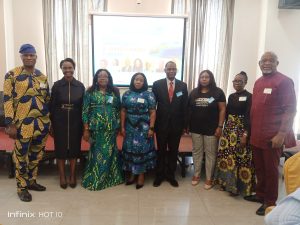
· Trawler operators attribute vessel depletion to illegal fishing
The Federal Government through the National Boundary Commission has got approval to extend its Exclusive Economic Zone (EEZ) from 200 Nautical Miles to 350 Nautical Miles.
The development comes about 10 years ago, Nigeria had applied for the extension of its Exclusive Economic Zone through the National Boundary Commission..
Speaking at a Maritime Breakfast meeting on illegal and unregulated fishing which held in Lagos on Thursday, a former Director General of the Nigerian Maritime Administration and Safety Agency (NIMASA); Mr. Temisan Omatseye said that there is need to have a satellite coverage of nation’s waters cannot be overemphasized more so when Nigeria has extended its Economic Exclusive Zone from 200 Nautical Miles to 350 Nautical Miles.
With the extra 150 miles additional space, there must be a deliberate effort to cover the waters by satellite, he argued.
He explained that foreigners come into Nigeria with their trawler factories and cart away juveniles and adult fishes, thereby damaging the nation’s aquatic resources and adding to the economic misfortune of Nigeria.
He said: “There is a need for us to have a total satellite coverage of our waters, it is absolutely imperative, the problem we have right now is that Nigeria has extended its Exclusive Economic Zone from 200 Nautical Miles to 350 Nautical Miles. “What is happening right now is that these foreigners have their trawler factories coming to Nigeria and they are doing a sweep of Nigerian waters and we know who they are”.
“They are Japanese, Chinese and Europeans and they are using illegal nets to catch all our small fishes and all the fishes and shrimps caught around waters in the West African sub-region are termed as Nigerian quota in the international market.”
Similarly, convener of the meeting; Mrs Tosan Edodo-Emore said that there has been a steady decline in the domestic production of fish and fishery activities.
Emore also said that between 1983 and 2000, the fish production level fell from 600,000 tons to 441,337 tons.
She explained that as Nigeria begin to develop her Blue economy, the challenges of illegal, unreported and unregulated fishing must be tackled headlong.
“It is on record that with a population of about 140 million local demand for fish outweighs the supply.
“This means that there is constant demand for fish and fish products which should keep the local fishing industry bouyant but the reality on ground tells a different story.
“The records show that there has been a steady decline in local catch and production of fish in Nigeria.
“In the 1970’s, domestic production of fish was said to range from 600,000 to 700,000 tonnes. By 1983 this dropped to 538,000 tonnes in 2000, local catch was 441,337 tonnes and today the figure is not encouraging,” she said.
Edodo-Emore said that the challenges of illegal, unreported and unregulated of fishing must be tackled for Nigeria to reap the gains of blue economy.
Meanwhile, the Nigerian Trawlers Owners Association (NITOA) said that the menace of illegal, unreported and unregulated fishing had led to the depletion of fishing trawlers in the country.
Okonkwo said that members of the association had a combined fleet of over 250 vessels and over 20 fishing companies.
This, she said, had drastically reduced to 150 vessels with about five presently struggling to survive.
She added that illegal fishing activities in the country was threatening Nigeria’s blue economy prospects.
Okonkwo called on the government to introduce initiatives that would boost the fishing industry.
“NITOA has been involved in industrial fishing activities in Nigeria since 1986 when some notable Nigerians initiated the idea of having a unified body to represent its members on issues of mutual interest.
“There is the need to establish Fisheries Terminal here in Lagos where about 95 per cent of the industrial fishing operators are based.
“Also, government should do well to resuscitate the Export Expansion Grant (EEG) Scheme, to make it more robust, workable and transparent,” she said.
She said that trawler owners were overburdened by overzealous government agencies overseeing sea fishing.
This, she said, was affecting the growth of the industry that should be a veritable source of local fish supply and foreign exchange earnings for the country.
“There is the need for the government to sit down with NITOA to chart a common course so as to harmonise the processes and procedures to attract more local and foreign direct investments.
“ Other areas that government must look into include; high cost of statutory registration and renewals of trawlers particulars from the regulatory agencies; occasional pirate attacks at high sea leading to loss of lives and property and damage of vessels and machines,” she said.
Follow us on Facebook/ twitter















